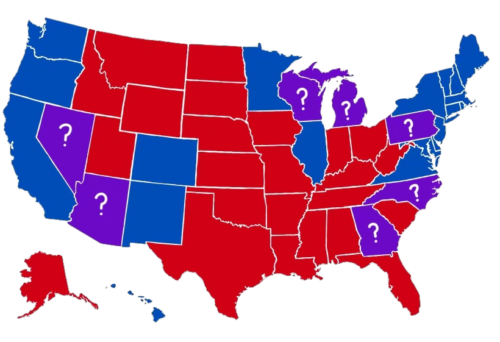Election night is less than two weeks away. With seven swing states on track to decide November’s results, students from Arizona, Georgia, Michigan, Nevada, North Carolina, Pennsylvania, and Wisconsin will play a significant role in determining the nation’s president for the next four years.
While Harvard consciously tries to have geographic diversity in each admitted class, it is hard to argue that the majority often come from prominent states such as California, Texas, Massachusetts, and New York. But in the wake of the 2024 presidential election, the focus is now on the voters who will play the most decisive role in determining its outcome. Recognizing this, the Independent polled Harvard students from the seven swing states.
The poll garnered 31 responses from mainly first-year students. Concerning each swing state, Pennsylvania and Michigan each had seven respondents, Arizona had five, Georgia had four, North Carolina and Nevada each had three, and Wisconsin had one (one respondent did not select their state).
When participants were collectively asked who they were voting for, 17 said Kamala Harris, seven said likely Kamala Harris, four said Donald Trump, two said likely Donald Trump, and one selected that they would vote for a third party candidate.
When asked about their motivations, most responses could be sorted into categories. Of the people voting for or leaning toward Trump, two cited a need for change or an issue with Biden, and one cited quality of life. In contrast, with Harris voters, seven respondents discussed personal beliefs or policies as a whole, and two mentioned abortion. The remainder of the participants discussed a variety of reasons.
These responses prompt significant questions about Harvard’s student body. Given the political leanings of states like California, New Jersey, New York, and Massachusetts, students from these areas will likely lean toward Kamala Harris. If we assume a similar trend regarding students from swing states, the poll results should have demonstrated an approximate 50-50 split between support for Trump and Kamala. However, 80% of respondents all leaned towards the Harris-Walz ticket. One might argue that Harvard does not have enough political diversity. However, the more likely explanation is the popularity of Harris among college students.
Harvard is not alone in its student body’s political leanings, which heavily votes for Harris. Recent polls show that about 57% of undergraduates around the country say they plan on voting for Harris, compared to only 19% for Trump.
Delving deeper into state-specific election trends, the urban-rural divide among voters is apparent. In 2020, Joe Biden won Michigan’s largest city, Detroit, by 91.5 points. The rest of the state was observed to vote more conservatively, with cities and suburbs that lean Democratic. The Independent talked to Harvard students from two parts of Michigan: Zoe Macaluso ’28 from Northern Michigan and Sandra Smith-Johnson ’28 from Detroit.
When asked about their thoughts on the election ahead, Macaluso said, “I’m feeling very excited just because I know how impactful my vote is.”
Smith-Johnson also agreed with this sentiment, stating she is “ready to get to the polls.”
Macaluso’s excitement for the upcoming election was also evident in her prediction for Michigan. “There are two big swing counties. They’re really worried about crime and inflation.” Macaluso is referencing Kent and Saginaw County, which are Michigan’s fourth and 11th largest. She said Trump has better messaging on how he “will deal with crime and how he handles the economy.”
These Michigan voters showcase the state’s two main voting blocs: rural and urban. Despite their different hometowns, both will have an equal say in determining the winner of Michigan on election day. The urban-rural divide will play out in swing states nationwide, not just Michigan.
Whether from a small town or big city, college students will represent major voting groups in their home states and could turn the tide of the election, depending on whether they show up for Harris or avoid voting. Election stakes are high, and Harvard students from swing states could decide who our next president is if the election is close enough.
Kalvin Frank ’28 (kfrank@college.harvard.edu) is excited about watching election night coverage on November 5th.

